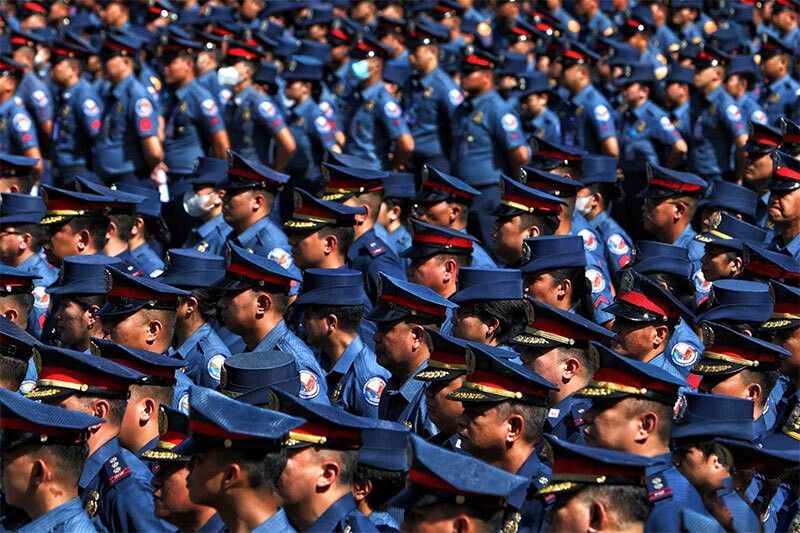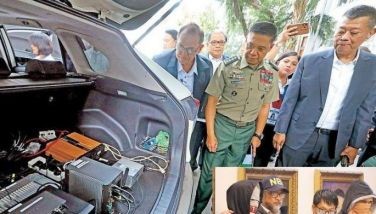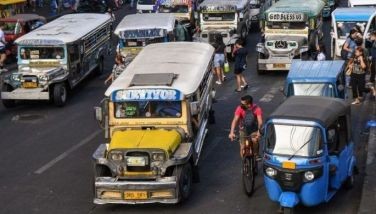PNP won’t arrest Duterte

MANILA, Philippines — Former president Rodrigo Duterte can sleep soundly as the Philippine National Police (PNP) will not implement any warrant of arrest coming from the International Criminal Court (ICC).
Col. Jean Fajardo, PNP public information officer, said yesterday that they are taking the cue from President Marcos, who earlier said the Philippines does not recognize the ICC’s jurisdiction over the country.
“They could issue a warrant of arrest to anyone, but the enforcement is another thing. Can they enforce it within the jurisdiction of the Philippine government?” Fajardo told a news briefing at Camp Crame.
“I think our President is very clear on that: they don’t have any jurisdiction here in our country,” she said.
Duterte’s former spokesman Harry Roque said the ex-president has information that he could be ordered arrested by the ICC at any time.
When asked if the PNP will not enforce an arrest warrant against Duterte from the ICC, Fajardo said: “Yes, because there is already a question of jurisdiction, because in our view, this is infringing on the sovereignty of our country.”
Fajardo said they have no idea where Roque got his information about Duterte’s impending arrest order.
She stressed that the PNP has not received any information about a warrant of arrest issued by the ICC.
Fajardo added the foreign affairs and justice departments have not coordinated with the PNP about Duterte.
For Fajardo, there is no reason for the ICC to interfere with the internal affairs of the Philippines as the country’s judicial system is working.
Stressing her point, Fajardo said there are police officers facing cases before the courts due to nefarious activities.
‘Never get him alive’
Duterte has said the ICC would never get him alive even if the tribunal issues an arrest warrant against him, according to Roque.
Roque said Duterte was “unfazed” when he received information that he could be arrested anytime, adding that the former president told him he would only submit himself to the jurisdiction of Philippine courts.
“He vowed that the ICC would never get him alive. Since he is already 80 years old, Tatay Digong would fight all attempts to have him detained and prosecuted in The Hague for alleged crimes committed in Philippine territory,” Roque said in a Facebook post on Feb. 7.
In an earlier Facebook live, Roque recounted how Duterte had called him to tell him he received information that he could be arrested “any time” in light of the ICC’s drug war probe.
According to Roque, Duterte said he would be arrested by Philippine law enforcers based on an arrest warrant from the ICC.
No need for memo
There is no need for President Marcos to issue a written memorandum circular to order government agencies not to implement an arrest warrant from the ICC should the tribunal issue such, according to Solicitor General Menardo Guevarra.
“The President’s repeated public statements are as good and effective as any written memorandum circular,” Guevarra said in a text message to reporters.
The solicitor general issued the remark in response to Roque’s call for Marcos to issue a circular on the matter.
In his column in The STAR on Feb. 3, Roque said Marcos should put in writing his official stand on the ICC’s preliminary investigation into his predecessor’s controversial war on drugs as one of the ways to resolve the public fallout between the Marcoses and the Dutertes.
Roque’s column was premised on the incumbent and former leaders’ recent word war as well as the snubbing incident between Vice President Sara Duterte and First Lady Liza Araneta-Marcos.
Roque said the Duterte family is “raising hell” because the government appears to be “open for cooperation” with the ICC on its probe where the former president and Sara are allegedly named as respondents.
“It is imperative for PBBM to issue a memorandum circular directing all Executive agencies to desist from coordinating and assisting any personnel from the Hague Court,” he said.
He added that the issuance would serve as “evidence” that the Philippine government does not recognize the ICC’s jurisdiction and is not obligated to cooperate with any ICC-related procedures or process.
President Marcos earlier said the Philippines does not recognize the ICC’s jurisdiction over the country, considering that his predecessor initiated the country’s withdrawal from the Rome Statute, which created the permanent tribunal.
Marcos, however, said ICC investigators can come and visit the country “as ordinary people.”
For his part, Guevarra earlier said that while the ICC can issue an arrest warrant against an individual, the enforcement of such is a “different matter” as the Philippines has no legal duty to cooperate with the tribunal “due to major issues of jurisdiction and sovereignty.”
He also said the government “will not lend any assistance” to the ICC in their investigation, “much less in the enforcement in Philippine territory of any processes issued by the ICC.”
Cooperate
For his part, former Supreme Court associate justice Antonio Carpio suggested to Duterte to cooperate instead with the ICC “to present his side.”
“He should cooperate because if you don’t show up there, then your voice is not heard, your side is not heard. While if you are innocent, if you really believe you’re innocent, the best thing to do is to go there and present your side,” he said in an interview.
While he said he has no information if any arrest warrant will be issued against Duterte, Carpio said the Rome Statute, which created the ICC, obliges state parties to implement an arrest warrant from the international court.
Carpio cited a Supreme Court ruling in 2021 which said the Philippines is still obliged to cooperate in criminal proceedings of the ICC, even if it has already withdrawn from the Rome Statute in 2019.
Article 27 of the statute says all proceedings done prior to withdrawal remain valid even after withdrawal. Duterte withdrew from the ICC in March 2018, a month after the court’s special prosecutor opened the preliminary examination.
With this, the ICC said it has jurisdiction over the country, noting that its investigation covers alleged crimes against humanity committed from Nov. 1, 2011 to March 16, 2019, when the Philippine was still a state party to the international treaty.
“It’s a new issue whether we are obliged to implement a warrant of arrest, considering that the alleged crimes happened while we are members of the ICC,” he said.
“Under the decision of the SC, we have to fulfill that duty, that our obligation to cooperate continues even after we have withdrawn, provided that the crimes were committed while we were members,” Carpio added. — Daphne Galvez
- Latest
- Trending
































